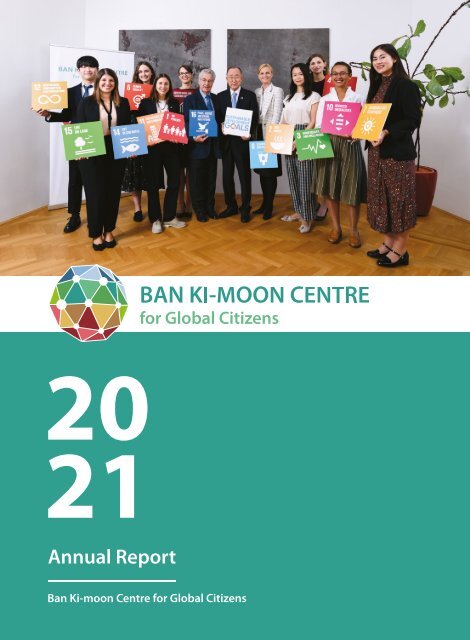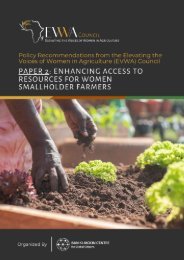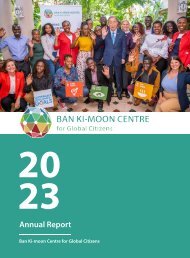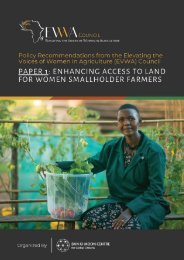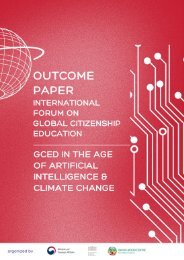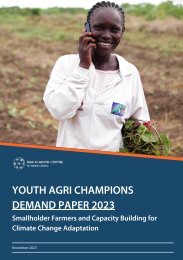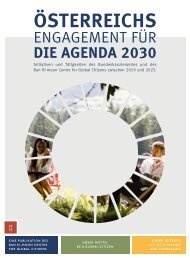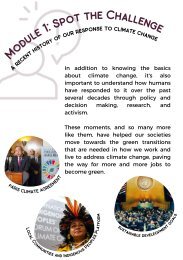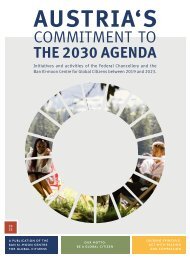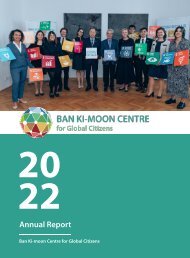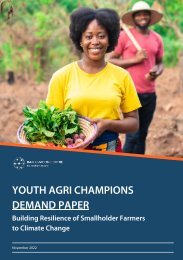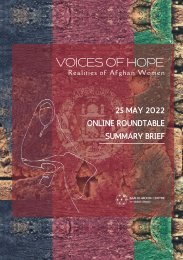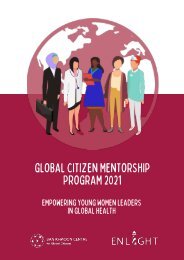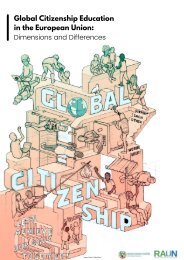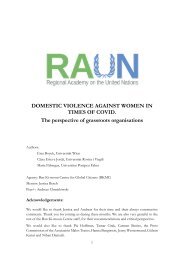BKMC Annual Report 2021
The Ban Ki-moon Centre 2021 Annual Report is out and covers all our activities tackling the climate crisis, global citizenship education, agricultural adaptation, and women-youth leadership! Big appreciation to our Board and all our partners who worked with us in achieving our goals
The Ban Ki-moon Centre 2021 Annual Report is out and covers all our activities tackling the climate crisis, global citizenship education, agricultural adaptation, and women-youth leadership! Big appreciation to our Board and all our partners who worked with us in achieving our goals
Create successful ePaper yourself
Turn your PDF publications into a flip-book with our unique Google optimized e-Paper software.
20<br />
21<br />
<strong>Annual</strong> <strong>Report</strong><br />
Ban Ki-moon Centre for Global Citizens<br />
1
Dear friends of the Ban Ki-moon Centre,<br />
Dear global citizens,<br />
Worldwide <strong>2021</strong> has been an eventful year, and, in many ways, a difficult one as<br />
the COVID-19 pandemic continues to influence our private and professional lives<br />
every day. At the same time, at the Ban Ki-moon Centre (<strong>BKMC</strong>) we are proud that<br />
our organization helped foster the Agenda 2030, global citizenship, and climate<br />
action in this difficult year.<br />
We can look back on many successful programs and partnerships supporting the<br />
leadership of current and future global citizens for implementing the Sustainable<br />
Development Goals and the Paris Climate Agreement. Thanks to our Board<br />
Members, we updated the <strong>BKMC</strong>’s strategy and have agreed upon the <strong>BKMC</strong>´s<br />
theory of change.<br />
Our <strong>BKMC</strong> fellows, mentees, and scholars are currently implementing more than<br />
170 SDG micro projects all over the globe, reaching over 730,000 people in Latin<br />
America, Africa, the Middle East, Asia, and Europe.<br />
Our efforts on climate smart agriculture secured major financial and political<br />
pledges from governmental donors. We continue this important work with Global<br />
Citizen and the Bill and Melinda Gates Foundation on food security and building<br />
the resilience of smallholder farmers.<br />
We also proactively supported UNESCO´s and SDSN´s efforts to enshrine the SDGs<br />
and climate action into curricula worldwide, and we co-led efforts in Austria to<br />
host the first ever national SDG Dialog Forum with several Austrian Ministers,<br />
civil society, academia, Parliament, and cultural entities to tackle the optimal<br />
implementation of the SDGs at all levels in our host country.<br />
The <strong>BKMC</strong> has more support in small donations and more attention on social<br />
media than ever before, but we also know that we are entering a year in which we<br />
need to dedicate a lot of our time to renewed fundraising efforts.<br />
We want to thank all our steadfast supporters and donors who have put their trust in<br />
us to change current and future leadership in favor of global citizenship and climate<br />
action, particularly supporting women and youth. Indeed, more needs to be done<br />
in 2022, and we look forward to working with all of you on the Agenda 2030.<br />
Monika Froehler<br />
Chief Executive Officer<br />
2 3
Dear friends of the Ban Ki-moon Centre,<br />
Dear friends of the Ban Ki-moon Centre,<br />
The year has been a rollercoaster of major scientific and technological<br />
advancements on the one hand, and worsening humanitarian crises and<br />
increased climate hazards on the other. However, global citizens around the world<br />
are speaking up and acting for an inclusive COVID-19 recovery plan, universal<br />
human rights, and a healthy planet.<br />
For more than two years now we have been challenged and tested on so many<br />
different levels by the ongoing pandemic, and, I must say, I feel grateful to all those<br />
who have acted in a spirit of collaboration and with global citizen thinking in these<br />
times. The climate crisis, humanitarian issues, and COVID-19 remain our collective<br />
struggles determining economies, societies, and ways of life.<br />
Heinz Fischer<br />
Co-chair<br />
Federal President of the<br />
Republic of Austria<br />
2004 - 2016<br />
In the face of present challenges, the <strong>BKMC</strong> has created new partnerships as well<br />
as strengthening old ones on a local, regional, and an international level. Our<br />
ongoing significant cooperation with the Austrian government resulted in the first<br />
national SDG Dialog Forum. This hybrid multi-stakeholder initiative to accelerate<br />
action towards the 2030 Agenda is planned to be an annual event.<br />
In line with the goals of the Paris Climate Agreement, the <strong>BKMC</strong> launched a twoyear<br />
program, Elevating Agricultural Adaptation (EAA), calling out governments<br />
and raising awareness about the urgency of climate adaptation for smallholder<br />
farmers. In compliment, our new online executive training, Young Women<br />
Leadership on Climate Adaptation, adds a gender dimension to climate resilient<br />
capacity-building.<br />
We further expanded our portfolio and reach in Latin America by successfully<br />
completing a women’s empowerment program in the region, with a specific focus<br />
on education for justice, good governance, and rule of law. This year’s mentoring<br />
program, in collaboration with the ENLIGHT Network, developed the skillset of<br />
young women currently studying in the field of global health. In <strong>2021</strong>, we are<br />
proud to count more than 200 young changemakers in our alumni network.<br />
Our recovery from COVID-19 must simultaneously address all these issues to help<br />
guide us towards a more sustainable and resilient future for all people and our<br />
planet. The urgent challenge we face now is to follow through on vaccine, climate,<br />
and gender justice for everyone.<br />
Many key moments took place in <strong>2021</strong>. COP26 was an important opportunity for<br />
world leaders to act on the promises made in Paris five years ago. Now, more than<br />
ever we need everyone´s support, and I especially count on global citizens around<br />
the world to raise their voices and pressure their leaders to turn these promises<br />
into action. Indeed, we must seize opportunities to encourage leadership and<br />
support from governments, businesses, cities, regions, and investors to create a<br />
healthy, fair, and sustainable future.<br />
After a long time, I was able to visit the <strong>BKMC</strong> in Vienna again. I had important<br />
discussions with my dear friend Co-chair Heinz Fischer, members of the <strong>BKMC</strong><br />
Board and staff, the heads of Vienna based UN organizations, and Austrian<br />
government representatives. These meetings underlined once again the valuable<br />
work and relationships the <strong>BKMC</strong> is fostering with high-level stakeholders and<br />
young leaders.<br />
Ban Ki-moon<br />
Co-chair<br />
United Nations<br />
Secretary-General<br />
2007 - 2016<br />
As new global threats to peace and prosperity emerge, we want to work with<br />
current leaders tackling these demanding issues as well as equipping those who<br />
are usually left out of decision-making processes, namely women and youth.<br />
The <strong>BKMC</strong> would like to thank the dedicated frontline workers, community<br />
organizers, activists, scholars, and policymakers around the world for their bravery,<br />
solidarity, inspiration, and commitment in challenging times like these. Our deep<br />
appreciation also goes to the <strong>BKMC</strong> Board, donors, and implementing partners,<br />
whose trust in our work and mission gives us the motivation to play our part in<br />
creating a better world for all.<br />
I remain confident that the Ban Ki-moon Centre team, together with our dedicated<br />
Board Members, will continue to advocate for the implementation of the SDGs<br />
and Paris Climate Agreement and will work tirelessly to empower women and<br />
youth around the world in the spirit of global citizenship.<br />
In this report you will find examples of leadership, aspiration, empathy, and unity.<br />
I hope that you, too, will be encouraged and inspired to join the collective efforts<br />
around the world to make the world a better place.<br />
4 5
1<br />
ABOUT US<br />
9-13<br />
CONTENTS<br />
2<br />
3<br />
4<br />
5<br />
OUR WORK<br />
15-37<br />
SDG MICRO-PROJECTS<br />
39-43<br />
OUR OUTREACH<br />
45-49<br />
OUR PEOPLE<br />
51-54<br />
6 7
1<br />
ABOUT<br />
US<br />
The Ban Ki-moon Centre for Global<br />
Citizens, established in January 2018,<br />
is a Quasi-International Organization<br />
located in Vienna, Austria.<br />
The Centre is co-chaired by Ban Kimoon,<br />
8th Secretary-General of the UN,<br />
and by Heinz Fischer, 11th President of<br />
the Republic of Austria.<br />
8
VISION<br />
Our vision is to build a better, more sustainable<br />
world, based on universal respect for human rights,<br />
regardless of age, gender, identity, religion, or<br />
nationality through a global citizenship mindset.<br />
MISSION<br />
Our mission is to foster leadership for the<br />
implementation of the Sustainable Development<br />
Goals (SDGs) and the Paris Climate Agreement by<br />
inspiring current decision makers and empowering<br />
the next generation of leaders and changemakers.<br />
OUR WORK<br />
Our work is guided by the Agenda 2030 and the<br />
Paris Climate Agreement under the co-leadership<br />
of Ban Ki-moon and Heinz Fischer. We advocate for<br />
governmental policymaking on global issues such<br />
as sustainable development, climate action, gender<br />
justice, and transformative education while offering<br />
direct opportunities for young potential leaders to<br />
amplify their voices and to equip them with SDG<br />
knowledge, 21st century skills, and global citizenship<br />
values.<br />
OUR FRAMEWORK<br />
1<br />
©Eugénie Sophie / Ban Ki-moon congratulates <strong>BKMC</strong> scholar Oyindamola Adegboye.<br />
In 2015, during his tenure as the 8th Secretary-General<br />
of the United Nations, <strong>BKMC</strong> Co-chair Ban Ki-moon<br />
led the adoption of two major commitments which<br />
promote human dignity for all while protecting the<br />
planet: The Paris Climate Agreement and The 2030<br />
Agenda for Sustainable Development.<br />
Together, these two frameworks build a roadmap for<br />
humanity to a better future. They are a rally call to<br />
action to eradicate extreme poverty with strategies<br />
that build economic growth and address a range<br />
of social needs including education, health, social<br />
protection, and job opportunities, while tackling<br />
climate change and environmental protection.<br />
Working tirelessly to make climate action a priority<br />
for national governments, Ban Ki-moon was behind<br />
a remarkable moment in history at the COP21 in<br />
2015 when 195 nations unanimously committed<br />
to the Paris Climate Agreement, making it the firstever<br />
universal, legally binding global climate change<br />
agreement. This was a crucial starting point in tackling<br />
the climate crisis, reducing greenhouse gas emissions,<br />
strengthening resilience, and enhancing abilities to<br />
adapt to climate change before the end of the century.<br />
Similarly, the implementation of the 2030 Agenda for<br />
Sustainable Development is crucial for the future of<br />
our planet. The 17 Sustainable Development Goals<br />
(SDGs) and their associated 169 targets provide a<br />
roadmap for peace and prosperity, ensuring that no<br />
one is left behind. They are interrelated, indivisible,<br />
and balance the three dimensions of sustainable<br />
development: economic, social, and environmental<br />
development.<br />
The Paris Climate Agreement and the SDGs form the<br />
framework of the <strong>BKMC</strong>, as their implementation is<br />
imperative to inspiring current decision makers and<br />
empowering the next generation of leaders and<br />
changemakers to build and transform societies, in<br />
which no one is left behind.<br />
10 11
OUR IMPACT<br />
1<br />
206<br />
Young Leaders<br />
Trained<br />
170<br />
SDG<br />
Micro-Projects<br />
730K+<br />
People Reached via<br />
SDG Micro-Projects<br />
65+<br />
Countries<br />
Reached<br />
54<br />
Partner<br />
Organizations<br />
13<br />
Partner<br />
Goverments<br />
15<br />
Donor<br />
Organizations<br />
35+<br />
Co-Chairs’<br />
Leadership Roles<br />
600+<br />
Outreach<br />
Activities<br />
45K+<br />
Global Citizen<br />
Actions Taken<br />
30K+<br />
Online Course<br />
Registrations<br />
43K+<br />
Online<br />
Followers<br />
12 13
2<br />
OUR<br />
WORK<br />
We use our independence, network,<br />
and expertise to engage with leaders,<br />
governments, academia, civil society,<br />
and international organizations to<br />
promote global citizenship. We believe<br />
in the impact of empowerment,<br />
inspiring leadership, inclusive policies,<br />
and global citizenship education.<br />
14
2<br />
for agricultural adaptation. The pledge of more than<br />
€220 million to CGIAR and of €58 Million to Crop<br />
Trust announced at Global Citizen Live Festival led<br />
to several bilateral meetings at COP26 creating new<br />
partnerships stepping into 2022.<br />
Since January <strong>2021</strong> and in partnership with Global<br />
Citizen, the <strong>BKMC</strong> collaborated closely with key<br />
governments including Germany, the Netherlands,<br />
Norway, the UK, and Zambia; conducted over 35<br />
bilateral c-level meetings to increase investment into<br />
agricultural adaptation; presented and performed at a<br />
total of 20 speaking engagements; published 6 media<br />
pieces with a total reach of 270+ million; distributed<br />
four call-to-actions with 43,000+ actions taken; and<br />
reached over 400,000+ users via campaigns over all<br />
social media accounts.<br />
© ...............................<br />
In 2022, the <strong>BKMC</strong> will continue to engage with<br />
high-level leaders to leverage financial and political<br />
commitments for agricultural adaptation and provide<br />
support for the backbone of our food systems –<br />
smallholder farmers.<br />
©Mwandwe Chileshe / Woman farmer in Zambia interviewed for the Elevating Agricultural Adaptation Program.<br />
ELEVATING AGRICULTURAL<br />
ADAPTATION<br />
©Katre Olmez / President of the European Commission Ursula<br />
von der Leyen on Global Citizen Live stage announcing pledge for<br />
climate adaptation.<br />
farmers is US$240 billion per year globally, but the<br />
existing climate finance for them only reached US$10<br />
billion in 2018. Hence, the need for serious measures.<br />
In early <strong>2021</strong>, Co-chair Ban Ki-moon led the Climate<br />
Adaptation Summit at which <strong>BKMC</strong> CEO Monika<br />
Climate change impacts every facet of life, but it<br />
Froehler highlighted the program in an anchoring<br />
particularly affects agriculture and water availability.<br />
side-event hosted with Global Citizen “Rising to the<br />
Smallholder farmers have been and will be hit hard by<br />
Challenge of Adapting Agriculture and Food Systems.”<br />
Goal:<br />
droughts, extreme rainfall, unreliable weather patterns,<br />
This was followed by Ban Ki-moon discussing<br />
Advocate for increased financial and political<br />
and pests. This issue is directly affecting countries that<br />
scaling up climate change adaptation at the African<br />
commitment in research and innovation to<br />
depend on the output of the agricultural sector and<br />
Development Bank Leaders’ Summit in April. In the<br />
increase the resilience of smallholder farmers.<br />
goes way beyond the Global South.<br />
second half of the year, focusing on the narrative<br />
of the daily lives of farmers in Africa, we spoke to<br />
Key Partners:<br />
In <strong>2021</strong>, the <strong>BKMC</strong> significantly strengthened its<br />
women who are smallholder farmers in Zambia in a<br />
advocacy efforts around climate action and specifically<br />
Bill and Melinda Gates Foundation, Global Citizen<br />
documentary on how their livelihoods are impacted<br />
agricultural adaptation. The Elevating Agricultural<br />
by climate change. We also conducted interviews<br />
Target Region:<br />
Adaptation (EAA) program officially launched in<br />
with young African leaders about agricultural funding<br />
January <strong>2021</strong> calls for increased financial and political<br />
Kenya, Nigeria, Rwanda, Zambia<br />
and employment opportunities. Ahead of COP26 in<br />
support of 500 million smallholder farmers who<br />
Glasgow, Ban Ki-moon virtually met with Alok Sharma,<br />
urgently need to adapt to the impacts of climate<br />
the President-Designate of COP26 and underlined<br />
change. The estimated financial need of smallholder<br />
that global champions like CGIAR need more funding<br />
©British Embassy Seoul / COP26 President-Designate Alok Sharma<br />
and <strong>BKMC</strong> Co-chair Ban Ki-moon meeting before COP26.<br />
16 17
2<br />
documents were delivered to IMAG to support their<br />
ongoing efforts.<br />
The Forum saw the participation of various Austrian<br />
ministers: Karoline Edtstadler, Federal Minister for EU<br />
and Constitution; Leonore Gewessler, Federal Minister<br />
of Climate Action, Environment, Energy, Mobility,<br />
Innovation and Technology; and Wolfgang Mückstein,<br />
Federal Minister for Social Affairs, Health, Care, and<br />
Consumer Protection; Antonella Mei-Pochtler, Special<br />
Advisor to the Austrian Chancellor and Head of<br />
ThinkAustria; and Nicola Brandt, Head of OECD Berlin<br />
Centre. CEO Monika Froehler moderated the overall<br />
Forum and PULS 4 Information Director Corinna<br />
Milborn moderated the high-level segment.<br />
The Public Opinion Poll surveying 2,000 individuals<br />
from civil society, Austrian schools, and Austrian<br />
businesses showed that the Austrian population<br />
is generally open-minded towards sustainable<br />
development. However, there is still a lack of awareness<br />
of the SDGs, with only 38% of Austrians having heard<br />
of the goals. An executive summary of the poll was<br />
shared with policymakers as a baseline assessment of<br />
how the SDGs are known and perceived in Austria.<br />
The research on SDG resources and gap analysis found<br />
that data visualization is a key missing resource for<br />
different stakeholders. The <strong>BKMC</strong> worked closely with<br />
Statistik Austria to prepare infographics visualizing<br />
SDG data in Austria to be shared with Austrian<br />
policymakers.<br />
In 2022, the <strong>BKMC</strong> looks forward to continuing and<br />
building upon its collaboration with the Austrian<br />
government.<br />
©Eugénie Sophie / SDG Dialogforum hosted with the Republic of Austria and SDG Watch at the Natural History Museum.<br />
ADVISING THE AUSTRIAN<br />
GOVERNMENT TO ACHIEVE THE SDGS<br />
Goal:<br />
Provide support for the Austrian Government’s<br />
strategy on SDG implementation.<br />
Key Partners:<br />
Austrian Government, SDG Watch Austria,<br />
Natural History Museum Vienna, Interministerial<br />
Working Group for the SDGs (IMAG)<br />
In <strong>2021</strong>, the <strong>BKMC</strong> continued its support of the<br />
Austrian Government’s ongoing efforts to accelerate<br />
SDG implementation. This year, the <strong>BKMC</strong> co-led the<br />
organization of Austria’s first ever multi-stakeholder<br />
SDG Dialogforum, conducted a public opinion poll,<br />
and completed research and a gap analysis on SDG<br />
resources available in Austria.<br />
Reaching over 20,000 people, the SDG Dialogforum<br />
hosted in September, fostered dialogue between civil<br />
society, academia, the private sector, and policymakers<br />
on the themes of digitalization, climate mitigation<br />
and adaptation, women, youth and leaving no one<br />
behind, and Austria in a global context. The takeaways,<br />
recordings, graphic illustrations, and summary<br />
©Eugénie Sophie / High-level segment participants: Corinna Milborn, Leonore Gewessler, Karoline Edtstadler, Antonella Mei-Pochtler, Wolfgang<br />
Mückstein<br />
18 19
2<br />
a side event at the High-Level Political Forum on the<br />
importance of SDG target 4.7 and attended UNESCO’s<br />
joint event with Education and Environment Ministers<br />
at UNFCCC COP26 in Glasgow.<br />
This year, the <strong>BKMC</strong> also worked closely with the<br />
Asia Pacific Centre for Education and International<br />
Understanding (APCEIU) as well as the University of<br />
Alberta and the University of Bologna to publish a<br />
report mapping GCED networks in Europe and North<br />
America. This helped to further our knowledge of<br />
existing GCED networks specifically in these regions.<br />
The <strong>BKMC</strong> led an outreach campaign for Mission<br />
4.7, spotlighting members of the Mission’s advisory<br />
groups and their contributions to transformative<br />
education. The #WeChampion campaign reached<br />
over 76,654 people via the <strong>BKMC</strong>’s and partners’ social<br />
media channels.<br />
In 2022, the Mission seeks to continue amplifying<br />
and supporting the work of UNESCO and their recent<br />
publication of the Futures of Education <strong>Report</strong>.<br />
Furthermore, it will continue to advocate for SDG target<br />
4.7 and its implementation at all levels, particularly<br />
encouraging leaders to make commitments and<br />
spotlighting best-practices.<br />
©Coline Graphics / <strong>BKMC</strong> and Bridge 47 hosted event highlights.<br />
©Jessica Besch / <strong>BKMC</strong> Monika Froehler.<br />
MISSION 4.7<br />
Goal:<br />
Bring together leaders from government,<br />
academia, and civil society to accelerate the<br />
implementation of transformative education<br />
(GCED and ESD) around the world.<br />
Key Partners:<br />
UNESCO, SDSN, Columbia University’s Center<br />
for Sustainable Development, SDG Academy,<br />
Global Schools Program<br />
Transformative Education delivers not only the<br />
knowledge, but also the competencies, values, and<br />
skills necessary for current and future generations<br />
to achieve the goals outlined in the 2030 Agenda<br />
and the Paris Climate Agreement. An umbrella term<br />
that encompasses the common objectives and<br />
methodologies of education outlined in SDG Target<br />
4.7 is an essential part of <strong>BKMC</strong>’s global citizenship<br />
portfolio.<br />
In the past year, Mission 4.7 focused on developing its<br />
workplan and considering where it can be of greatest<br />
value to the ongoing efforts promoting SDG target<br />
4.7 by engaging with its Patrons – H.E. Ban Ki-moon<br />
and Director-General of UNESCO Audrey Azoulay<br />
–, Co-chairs, High-Level Advisory Group, Education<br />
Taskforce, and operational Secretariat.<br />
Through Mission 4.7, the <strong>BKMC</strong> has supported<br />
the ongoing work of UNESCO promoting and<br />
participating in a dozen engagements dedicated to<br />
Education for Sustainable Development (ESD) and<br />
Global Citizenship Education (GCED). These include<br />
the UNESCO ESD Conference in Berlin where the<br />
<strong>BKMC</strong> co-hosted a session with Bridge 47 as well as<br />
the 5th UNESCO Forum on Global Citizenship where<br />
<strong>BKMC</strong> CEO Monika Froehler moderated a session with<br />
practitioners of ESD/GCED. The Centre also co-hosted<br />
MISSION<br />
47.<br />
20 21
2<br />
©John Hewat, CARE / Cleo from Zambia, a beneficiary of CARE.<br />
YOUNG WOMEN LEADERSHIP<br />
ON CLIMATE ADAPTATION IN AFRICA<br />
©Pacy Marondji / <strong>BKMC</strong> trainee Pacy Marondji working on her waste management SDG Micro-Project in the Democratic Republic of Congo.<br />
30 6 25<br />
TRAINEES<br />
COUNTRIES<br />
PARTNERS<br />
Goal:<br />
Elevate the leadership of young African women<br />
to be changemakers for climate adaptation.<br />
Key Partners:<br />
Global Center on Adaptation, CARE Climate and<br />
Resilience Academy, Diplomatic Academy of<br />
Vienna, Norad<br />
Climate change is a reality with severe impacts,<br />
hitting the most vulnerable the hardest. Women’s<br />
leadership at all levels results in greater capability to<br />
respond to climate-related threats. In <strong>2021</strong>, the <strong>BKMC</strong><br />
joined forces with the Global Center on Adaptation to<br />
respond to this fact and build women’s leadership on<br />
climate adaptation.<br />
In cooperation with the CARE Climate and Resilience<br />
Academy and the Diplomatic Academy of Vienna,<br />
the <strong>BKMC</strong> developed an Online Executive Training<br />
that elevates the leadership of young women to be<br />
changemakers for climate adaptation. During 20<br />
weeks of training, participants build their knowledge<br />
on gender-sensitive climate adaptation, enhance<br />
their leadership skills, and expand their professional<br />
networks.<br />
The pilot cycle of the Online Executive Training<br />
was launched in October and brought together 30<br />
outstanding young women from the Democratic<br />
Republic of the Congo, Ghana, Egypt, Kenya, Nigeria,<br />
and Zimbabwe. Eager to foster climate adaptation,<br />
they have either founded their own initiatives or have<br />
demonstrated remarkable leadership while working<br />
for startups, NGOs, international organizations,<br />
government, or academia.<br />
Until March 2022, 15 training modules, facilitated<br />
by experts and covering a wide range of topics, will<br />
prepare the trainees to innovate community-based<br />
solutions that build resilience to a changing climate.<br />
Moreover, by building lasting connections with<br />
renowned experts, leaders, and their peers, they will<br />
be empowered to transform the realities of many by<br />
elevating climate resilience across regions, genders,<br />
and generations.<br />
22 23
2<br />
©<strong>BKMC</strong> / <strong>BKMC</strong> Global Citizen Fellows <strong>2021</strong> cohort.<br />
GLOBAL CITIZEN<br />
FELLOWSHIP PROGRAM<br />
©Dámaris Herrera Sal / <strong>BKMC</strong> Fellow Dámaris Herrera Sal working on her SDG Micro-Project to improve women empowerment in Peru.<br />
18<br />
FELLOWS<br />
20 5COUNTRIES<br />
PARTNERS<br />
Goal:<br />
Equip young global citizens with leadership<br />
skills through tailor-made trainings, empowering<br />
them to act for the SDGs.<br />
Key Partners:<br />
United Nations Office on Drugs and Crime, State<br />
of Qatar, Diplomatic Academy of Vienna<br />
Recognizing the need for a generation of global<br />
leaders, the <strong>BKMC</strong>’s Global Citizen Fellowship Program<br />
combine intensive leadership trainings, unique<br />
networking opportunities, and the implementation of<br />
SDG Micro-Projects to empower young individuals to<br />
act for the SDGs.<br />
In <strong>2021</strong>, the <strong>BKMC</strong> was able to provide fully funded<br />
Global Citizen Fellowships to 20 young changemakers<br />
from Latin America: Bolivia, Brazil, El Salvador, Honduras,<br />
and Peru, thanks to the support of the United Nations<br />
Office on Drugs and Crime and the State of Qatar. The<br />
fellows were selected to participate in the <strong>BKMC</strong>’s<br />
Women’s Empowerment Program (WEP) Latin America,<br />
aiming to elevate young women’s leadership to foster<br />
justice, the rule of law, and the SDGs in Latin America.<br />
For the first time, the program’s leadership training<br />
component, executed in cooperation with the<br />
Diplomatic Academy of Vienna, was held entirely online.<br />
Regularly meeting through Zoom, the two-months of<br />
training solidified the fellows’ knowledge about the<br />
SDGs, gender issues, justice, and the rule of law and<br />
strengthened their changemaker skills. The fellows<br />
were exposed to unique networking opportunities,<br />
taking part in exclusive events, and interacting with<br />
high-level leaders such as <strong>BKMC</strong> Board Member Irina<br />
Bokova and President of the 73rd session of the United<br />
Nations General Assembly, María Fernanda Espinosa.<br />
During the next six months, the fellows will remotely<br />
implement 20 SDG Micro-Projects in their communities<br />
in Latin America; these projects particularly aim to<br />
strengthen the empowerment of women and girls<br />
and promote justice. Simultaneously mentored by<br />
the <strong>BKMC</strong> and further guided by experts, the fellows<br />
will pass on their learnings, multiply the impact, and<br />
give testimony to the notion that empowered women<br />
empower women.<br />
24 25
2<br />
©<strong>BKMC</strong> / <strong>BKMC</strong> Global Citizen Scholars <strong>2021</strong> cohort.<br />
GLOBAL CITIZEN<br />
SCHOLARSHIP PROGRAM<br />
©Gillian Ndlovu / <strong>BKMC</strong> Scholar Gillian Ndlovu planting trees for her SDG Micro-Project Bliss in Zimbabwe.<br />
8 5 15<br />
SCHOLARS<br />
COUNTRIES<br />
PARTNERS<br />
Goal:<br />
Highlight and train young African changemakers<br />
to accelerate and scale their SDG efforts.<br />
Key Partners:<br />
RELX Group, University of Bordeaux<br />
The Global Citizen Scholarship Program empowers<br />
young, active global citizen leaders engaged with<br />
the SDGs who can benefit from valuable educational<br />
opportunities, networking experiences, and peer-topeer<br />
exchange.<br />
In <strong>2021</strong>, the <strong>BKMC</strong> granted eight scholarships to<br />
young African changemakers from Cameroon,<br />
Kenya, Madagascar, Nigeria, and Zimbabwe. For a<br />
second year, the program was made possible with<br />
the generous financial support of RELX Group and<br />
was carried out in partnership with the University of<br />
Bordeaux and their summer school program.<br />
This year, the program included participation in a<br />
multidisciplinary academic training course at the<br />
University of Bordeaux on “African Cities in 2030”,<br />
six expert workshops on various themes including<br />
project management and fundraising, one-on-one<br />
mentoring, guidance in the implementation of an<br />
SDG Micro-Project over a six-month period, and<br />
networking opportunities.<br />
The SDG Micro-Projects carried out by this years’<br />
scholars ranged from implementing garden sacks in<br />
deep sea slum communities in Nairobi, Kenya, and<br />
orchard planting at schools in Bindura, Zimbabwe,<br />
to empowering over 500 slum children through<br />
educational opportunities in Nigeria and educating<br />
a community in Yaoundé, Cameroon about low-cost<br />
sustainable building materials for affordable housing.<br />
For the first time, the scholarship program provided<br />
seed-funding of €500 to each scholar for their SDG<br />
Micro-Projects.<br />
Through their projects, the scholars addressed 11<br />
different SDGs in total and reached over 1,770 people<br />
directly in their communities.<br />
26 27
2<br />
©<strong>BKMC</strong> / <strong>BKMC</strong> Global Citizen Mentees <strong>2021</strong> cohort.<br />
GLOBAL CITIZEN<br />
MENTORSHIP PROGRAM<br />
©Shireen Shehzad Bhamani / <strong>BKMC</strong> Mentee Shireen Shehzad Bhamani’s SDG Micro-Project supporting elderly persons in convalescent homes in Pakistan.<br />
29<br />
MENTEES<br />
15 9COUNTRIES<br />
PARTNERS<br />
Goal:<br />
Mentor and empower young women to become<br />
leaders contributing to the achievement of SDG3<br />
in global health.<br />
Key Partners:<br />
ENLIGHT University Network<br />
Acknowledging that women still only represent 25%<br />
of decision makers in healthcare systems despite<br />
representing over 70% of the global healthcare<br />
workforce, the <strong>BKMC</strong> launched a new mentorship<br />
program for young women leaders in global health.<br />
The program includes one-on-one mentoring, peerto-peer<br />
learning, capacity-building for the SDGs,<br />
mentee workshops, support in implementing an SDG<br />
Micro-Project, and networking opportunities.<br />
As an associated partner of ENLIGHT – a European<br />
university network dedicated to transforming<br />
European higher education into one which empowers<br />
learners as global citizens –,the <strong>BKMC</strong> selected<br />
mentors and mentees from ENLIGHT universities and<br />
their global partners representing France, Belgium,<br />
the Netherlands, Germany, Ecuador, Uganda, Nigeria,<br />
Togo, and Mexico.<br />
The mentorship program is currently empowering 15<br />
young women studying in a field related to Global<br />
Health – at bachelors, masters, and PhD levels – to<br />
become leaders in research and practice, supporting<br />
a more sustainable and equitable future in healthcare<br />
for us all.<br />
Global Health is closely linked to SDG 3‘Good health<br />
and well-being’, - ensuring healthy lives and promote<br />
well-being for all at all ages. Currently the mentees<br />
are implementing SDG Micro-Projects in their<br />
communities with the support of their mentors.<br />
Proposed projects range from providing sexual<br />
health knowledge for people in French Guiana and<br />
offering group sessions on resilience building skills<br />
for elderly people in nursing homes in Pakistan, to a<br />
project involving sex workers and denouncing the<br />
violence they face in Togo and addressing the impact<br />
of COVID-19 on the provision of maternal health and<br />
childcare in Uganda.<br />
Following the launch of the program in June <strong>2021</strong>, the<br />
<strong>BKMC</strong> looks forward to seeing how our mentees grow<br />
and to the results of their projects.<br />
28 29
2<br />
© Kat J. Weiss<br />
©<strong>BKMC</strong> / <strong>BKMC</strong> UNODC ASEAN youth cohort.<br />
ASEAN YOUTH<br />
FOR SDGs<br />
©Kat J. Weiss / Illustrations of <strong>BKMC</strong> SDG Micro-Projects.<br />
33 9 6<br />
LEADERS<br />
COUNTRIES<br />
PARTNERS<br />
Goal:<br />
Elevate the knowledge and skills of youth<br />
ASEAN representatives to effectively contribute<br />
to the SDGs and become SDG leaders in their<br />
communities.<br />
Key Partners:<br />
United Nations Office on Drugs and Crime<br />
(UNODC), Government of Japan<br />
During March and April of <strong>2021</strong>, the <strong>BKMC</strong> hosted a<br />
novel webinar series, focusing on the SDGs and global<br />
citizenship in cooperation with the United Nations<br />
Office on Drugs and Crime (UNODC). The series was<br />
held in support of the UNODC’s Education for Justice<br />
initiative, which is built on the conviction that education<br />
for children and youth is fundamental in promoting a<br />
culture of lawfulness. With the financial support of the<br />
Government of Japan, the webinar series elevated the<br />
knowledge and skills of 33 youth representatives from<br />
the Southeast Asian region to effectively contribute to<br />
the SDGs in their communities.<br />
Online training sessions introduced the cohort to the<br />
SDGs and global citizenship, empowered them to spot<br />
challenges and find respective solutions, and built up<br />
their confidence to turn their ideas into action.<br />
At the margins of the 14th UN Crime Congress in<br />
Kyoto, the ASEAN youth representatives participated<br />
in a virtual side event, engaging with experts and<br />
senior professionals, who put the topics relevant to the<br />
Congress into practice.<br />
In a subsequent SDG Micro-Project incubator phase,<br />
the youth representatives received guidance to plan<br />
individual SDG Micro-Projects that respond to local<br />
challenges in their region, thereby contributing to the<br />
achievement of the SDGs. The 33 innovative solutions<br />
in the form of ideated SDG Micro-Projects particularly<br />
addressed SDG 4 Quality Education, SDG 3 Good Health<br />
and Well-Being, and SDG 16 Peace, Justice and Strong<br />
Institutions.<br />
At the end of the series, the youth representatives<br />
understood that they can make a difference in achieving<br />
the SDGs when acting with passion and compassion.<br />
30 31
2<br />
Feminist Foreign Policy jointly conducted a series<br />
of seven climate justice webinars on topics ranging<br />
from theories of intersectionality and feminist foreign<br />
policy to marginalized climate activism and the role of<br />
art and culture in tackling climate injustice.<br />
“Climate Justice 4 All - An Approach to Intersectional<br />
and Feminist Climate Action” aimed to empower<br />
activists, academia, policymakers, and civil society<br />
in using climate advocacy and implementation<br />
strategies in the framework of the SDGs through an<br />
intersectional feminist lens.<br />
The webinar series focused on knowledge exchange,<br />
joint learning, the creation of safe spaces, and<br />
networking by opening the floor to as many people<br />
as possible so that different voices could be heard and<br />
so there was increased awareness of issues usually<br />
avoided or simply unknown.<br />
We welcomed inspirational speakers such as Nisreen<br />
Elsaim, Hindou Oumarou Ibrahim, Mitzi Jonelle,<br />
David Lammy, and Mary Robinson, who all greatly<br />
contributed to our video summary and policy<br />
paper. The two outcome products available to<br />
everyone compile the speakers’ expertise and lay the<br />
©DisobeyArt / Banner from climate change protest.<br />
groundwork for intersectional and effective climate<br />
action that benefits all.<br />
The project was supported with the financial<br />
contribution of the Austrian Federal Ministry of Climate<br />
Action, Environment, Energy, Mobility, Innovation and<br />
Technology and the RELX SDG Resource Hub.<br />
©Jacob Lund / Activists doing a silent protest to save planet earth at climate change protest.<br />
CLIMATE JUSTICE 4 ALL<br />
WEBINAR SERIES<br />
Goal:<br />
Elevate the climate advocacy knowledge and<br />
skills of young changemakers to contribute to the<br />
Paris Climate Agreement and the SDGs through<br />
an intersectional lens.<br />
Key Partners:<br />
Austrian Federal Ministry of Climate Action,<br />
Environment, Energy, Mobility, Innovation and<br />
Technology, the RELX SDG Resource Hub, The<br />
Centre for Feminist Foreign Policy.<br />
Climate justice means racial, social, environmental,<br />
economic, and health justice, and, in striving for it,<br />
applying an intersectional perspective that keeps all<br />
these issues in mind as one interconnected system.<br />
The climate crisis brings forth inherent global<br />
injustices already experienced by the marginalized.<br />
Women and children, Black, Indigenous, and People<br />
of Color (BIPoC), LGBTQIA+ communities, people<br />
with disabilities, and many more too often lack a seat<br />
at environmental decision-making and negotiation<br />
tables.<br />
In recognition of these structural inequalities, in<br />
<strong>2021</strong>, the Ban Ki-moon Centre and the Centre for<br />
©Erik McGregor / Activists at climate change protest in the USA.<br />
32 33
2<br />
©<strong>BKMC</strong> / Orange the World commemoration ceremony at the Austrian Museum of Folk Life and Folk Art.<br />
ORANGE THE WORLD:<br />
ENDING VIOLENCE AGAINST WOMEN<br />
Goal:<br />
Raise awareness on UN Women’s campaign on<br />
gender-based violence and violence against<br />
women and girls.<br />
Key Partners:<br />
HeforShe, Soroptimist International, UN<br />
Women Austrian National Committee<br />
Violence against women is still one of the most<br />
widespread human rights violations around the world,<br />
and COVID-19 has exacerbated the problem. The Orange<br />
the World campaign, spearheaded by UN Women<br />
which was founded under Ban Ki-moon’s leadership,<br />
raises worldwide awareness during the annual 16 Days<br />
of activism against gender-based violence between 25<br />
November and 10 December.<br />
In the first quarter of <strong>2021</strong>, the <strong>BKMC</strong> published an<br />
action brief, addressing the necessary actions to curb the<br />
spike in violence against women during COVID-19. The<br />
recommendations presented in the brief highlighted<br />
the perspectives of the private sector, international<br />
organizations, governments, and civil society.<br />
©Graz_UN Women / Technical University Graz lit up for Orange the World.<br />
Drawing from this expertise, <strong>BKMC</strong> Program Officer Viola<br />
Christian featured in a live broadcast by Al Jazeera World<br />
News to address the severe effects of the pandemic on<br />
domestic violence, cyber violence, and other forms of<br />
gender-based violence.<br />
To further investigate the impact of the pandemic on<br />
violence against women, the <strong>BKMC</strong> mentored a group of<br />
young researchers of the Regional Academy of the United<br />
Nations (RAUN) who analyzed the realities of women’s<br />
organizations dealing with the shadow pandemic on a<br />
daily basis.<br />
Later in the year, <strong>BKMC</strong>’s advocacy efforts strongly focused<br />
on the issue of femicides. Together with its Austrian<br />
partners, the <strong>BKMC</strong> organized an online symposium on<br />
femicides, highlighting the role men must take in the<br />
fight against violence against women. The <strong>BKMC</strong> also<br />
curated a video campaign featuring Bertha Tobias of the<br />
#ShutItAllDown movement in Namibia, Liliana Oropeza<br />
of the #NiUnaMenos movement of Latin America, and<br />
Zeycan Rochelle Yıldırım of the #ChallengeAccepted<br />
movement in Turkey. The young activists illustrated the<br />
power that lies within young people to bring about<br />
change and hold decision-makers accountable.<br />
©<strong>BKMC</strong> / Orange the World video campaign speakers.<br />
34 35
2<br />
against women during COVID-19 in Austria, Spain,<br />
Sweden, and Turkey. The increase in demands for<br />
survivors showed the need for financial stability,<br />
inclusion in political decision-making, and adequate<br />
training for all stakeholders involved.<br />
The <strong>BKMC</strong> is part of the Knowledge Association<br />
Board of the Climate Wanderers which aims to get<br />
to the roots of regional climate change experiences<br />
by walking through different climate zones across<br />
European countries from Norway to Portugal.<br />
While the walk was postponed to June 2022 due<br />
to COVID-19, the group completed a walk through<br />
Austria where they listened to local stories to foster a<br />
people-centered approach to climate change.<br />
The <strong>BKMC</strong> also partnered with Ghent University<br />
Summer School Program by providing stipends to<br />
exceptional young people from Albania, Cameroon,<br />
Ethiopia, Ghana, Nigeria, and South Africa working in<br />
the fields of gender equality, health, and development.<br />
The educational program on SDG3 consisted of<br />
online lectures from renowned professors and<br />
international experts in the fields of human rights,<br />
health inequalities, migration, and infectious diseases.<br />
©Climate Walk <strong>2021</strong> / <strong>BKMC</strong> CEO Monika Froehler speaking at<br />
Climate Wanderers welcome event in Vienna.<br />
©Climate Walk <strong>2021</strong>.<br />
ACADEMIC<br />
WORK<br />
Goal:<br />
Curate meaningful educational collaborations<br />
that allow <strong>BKMC</strong>’s work and portfolio to expand.<br />
Key Partners:<br />
University of Business and Economics Vienna,<br />
Regional Academy United Nations (RAUN),<br />
Climate Wanderers, Ghent Summer School,<br />
Management Center Innsbruck (MCI), Asia-<br />
Pacific Centre of Education for International<br />
Understanding (APCEIU)<br />
The <strong>BKMC</strong> highly values its collaborations with various<br />
academic institutions, which range from research and<br />
studies to higher education opportunities.<br />
In <strong>2021</strong>, Vienna University of Business and Economics<br />
students examined lessons learned by youth<br />
organizations regarding online engagement during<br />
the pandemic. The students put forth a set of<br />
recommendations and strategies that helped <strong>BKMC</strong><br />
optimize its online engagement with its audience.<br />
On behalf of the <strong>BKMC</strong>, the <strong>2021</strong> RAUN scholars,<br />
Esra Böyük, Maria Fabregas, and Clara Esteve Jorda,<br />
analyzed national policies and the work of grassroots<br />
feminist organizations in tackling domestic violence<br />
The Ban Ki-moon Scholarship was established with<br />
the MCI and aims to support changemakers who wish<br />
to engage, act, and find solutions for the SDGs and<br />
become young leaders for their communities. Two<br />
outstanding students from Nigeria and Pakistan were<br />
awarded the scholarship in <strong>2021</strong>, and they attended<br />
an MCI master’s program dedicated to the SDGs and<br />
Global Citizenship.<br />
The <strong>BKMC</strong> and APCEIU published the report “Europe<br />
and North America Regional GCED Network” led by<br />
Lynette Shultz from the University of Alberta and<br />
Massimiliano Tarozzi from the University of Bologna.<br />
The study explored who the European and North<br />
American actors on GCED are and how the networks,<br />
NGOs, researchers, and educational institutions are<br />
linked.<br />
©Vielle Serraon / <strong>BKMC</strong> research report on GCED.<br />
36 37
3<br />
SDG<br />
MICRO-<br />
PROJECTS<br />
SDG Micro-Projects are initiatives created<br />
and implemented by Ban Ki-moon Centre<br />
fellows, mentees, or scholars, that tackle<br />
one or more SDGs on a local, national, or<br />
international level. The projects vary in<br />
size and concept carrying the common<br />
goal to find a solution for the challenges<br />
faced in achieving the 2030 Agenda.<br />
38
SDG 17<br />
SDG 6<br />
ABOUT SDG MICRO-PROJECTS HIGHLIGHTED PROJECTS <strong>2021</strong><br />
3<br />
Young changemakers have a crucial role to play<br />
in the implementation of the SDGs. Therefore, the<br />
<strong>BKMC</strong> encourages and trains young global citizens<br />
all over the globe to undertake SDG Micro-Projects<br />
in their local communities. <strong>BKMC</strong> fellows, scholars,<br />
and mentees are encouraged to spot a real-world<br />
challenge, work on solutions, and venture out to make<br />
a change with targeted actions for the SDGs that reach<br />
a wide network of people. With these projects, the<br />
young leaders address a specific societal challenge<br />
that needs to be transformed into an opportunity.<br />
Everyone in the <strong>BKMC</strong> network shares the conviction<br />
that small actions, taken by each person, can move<br />
mountains and can ultimately play a crucial role in<br />
achieving the SDGs. This conviction is integrated<br />
into various <strong>BKMC</strong> programs to equip young and<br />
dedicated individuals with the skills, knowledge, and<br />
network they need to become agents of change for<br />
the achievement of the SDGs.<br />
For the success of the young leaders, the <strong>BKMC</strong> offers<br />
guidance and mentorship from initial ideation to the<br />
final steps of project implementation, and at scaling<br />
the success and impact of their SDG Micro-Projects.<br />
SDG 11<br />
While the SDG projects address all the Global Goals, there is a particular focus on SDG3, SDG4, SDG5, SDG10,<br />
and SDG13 representing the <strong>BKMC</strong>’s work in global health, gender justice, global citizenship education,<br />
reducing inequalities, and climate action.<br />
SDG 10<br />
SDG 13<br />
SDG 12<br />
SDG 15<br />
SDG 14<br />
SDG 16<br />
SDG 9<br />
SDG 8<br />
SDG 7<br />
SDG 1<br />
SDG 5<br />
SDG 2<br />
SDG 3<br />
SDG 4<br />
Gillian Ndlovu - <strong>BKMC</strong> Scholar<br />
Zimbabwe<br />
Shireen Shehzad Bhamani - <strong>BKMC</strong> Mentee<br />
Pakistan<br />
Gillian’s SDG Micro-Project champions sustainable diets, environmental responsibility, and<br />
agriculture “in communities, by communities, and for communities.” Through the project<br />
BLISS, school children attended a capacity-building workshop and then participated in the<br />
refurbishment of their school orchard, planting a total of 50 fruit trees. Moreover, BLISS’ reach<br />
went beyond the classroom as Gillian shared a handout with the children’s guardians on<br />
nurturing sustainability at home. She plans to scale her project and hopes that it will be<br />
replicated by many other schools in Zimbabwe and beyond.<br />
Shireen’s SDG Micro-Project addresses SDG 3 by supporting the mental health of elderly<br />
people residing in convalescent homes in Pakistan. Aware that the depression rate among<br />
elderly people was aggravated by the ongoing pandemic, her project focuses on promoting<br />
resilience amongst the elderly through skill-building sessions, thus helping them overcome<br />
or manage depression. She will conduct an evaluation after these sessions to monitor<br />
changes, hoping for increased resilience and use of healthy coping mechanisms, thereby<br />
decreasing the suffering caused by depression.<br />
Isabela de Siqueira Barbosa - <strong>BKMC</strong> Fellow<br />
Brazil<br />
Isabela’s SDG Micro-Project contributes to SDG 5 and SDG 16 by working with 20 young<br />
men and women between the ages of 16 and 20, informing them about the Brazilian justice<br />
system and how it deals with cases of violence against women. Simulating a mock trial,<br />
participants became aware of women’s rights and women’s possibilities to access justice<br />
when falling victim to violence. She currently plans to replicate and scale her project to<br />
effectively combat violence against women in Brazil.<br />
18-35 206 170 43 730K+<br />
AGE RANGE<br />
NUMBER OF<br />
YOUNG LEADERS<br />
NUMBER OF<br />
PROJECTS<br />
NUMBER OF<br />
COUNTRIES<br />
PEOPLE<br />
REACHED<br />
Soktheareak Hoeur - <strong>BKMC</strong> ASEAN Youth for SDGs<br />
Cambodia<br />
Soktheareak’s SDG Micro-Project strengthened the financial literacy of 15 young adults in<br />
Phnom Penh, Cambodia. Soktheareak addressed the challenge of increasing microloan<br />
debts linked to poor financial literacy leading to forced child labor, labor migration, and food<br />
insecurity. Through a combination of workshops, a social media campaign, and educational<br />
brochures, Soktheareak equipped the participants with different strategies and raised widescale<br />
awareness on the importance of financial education.<br />
40 41
SDG PROJECTS<br />
3<br />
SDG Micro-Projects are initiatives that tackle one or more<br />
SDGs on a local, national, or international level. The projects<br />
on this map are created and implemented by Ban Ki-moon<br />
Centre fellows and scholars for achieving the 2030 Agenda.<br />
Mongolia / Anukhatan Tsevegmid<br />
Training program to bring women back<br />
into the work environment after long term<br />
unemployment in the capital of Mongolia.<br />
Kuwait / Latifa AlWazzan<br />
Building greenhouses powered by solar<br />
energy in addition to a garden planted with<br />
edible greens in a public school in Kuwait.<br />
South Korea / Eunhee Choi<br />
Research and publication on gender<br />
based violence to foster solidarity<br />
and dialogue between Austrian and<br />
South Korean women’s activism.<br />
Cameroon / Tahirih Munji<br />
Promoting the use of local materials in the<br />
construction of houses in a semi-urban locality<br />
by organizing workshops on the manufacture<br />
and use of interlocking stabilized soil bricks<br />
and clay roof tiles.<br />
Nairobi / Bessy Thuranira<br />
Increasing access to food for the women in<br />
Deep Sea Slum by empowering them with<br />
skills on garden-sack and container farming.<br />
Cambodia / Sovanvatey Khuon<br />
Workshop for young Cambodian leaders<br />
from rural areas on how they can use<br />
digital storytelling to create change.<br />
42 43
4OUR<br />
OUTREACH<br />
The Ban Ki-moon Centre for Global<br />
Citizens Co-chairs and staff take part in<br />
multiple opportunities to engage with<br />
global citizens all around the world.<br />
These include speaking engagements,<br />
hosting events, conducting workshops<br />
and trainings, creating digital campaigns<br />
and competitions, as well as carving out<br />
new partnerships.<br />
44
BKM delivers opening remarks at UNESCO Paris Virtual<br />
Conference on LGBTI+ Youth Rights and Inclusion<br />
<strong>BKMC</strong> co-hosts Transformative Education session at<br />
UNESCO Conference on ESD2030<br />
4<br />
01/<strong>2021</strong><br />
Ban Ki-moon leads & calls for climate action at<br />
the Climate Adaptation Summit <strong>2021</strong><br />
CEO Froehler joins the side event Agriculture<br />
and Food Security at the Climate<br />
Adaptation Summit <strong>2021</strong><br />
Ban Ki-moon gives an interview with<br />
newspaper die Furche “We need more<br />
Global Citizens”<br />
<strong>BKMC</strong> hosts an SDG workshop on Sustainable<br />
Agriculture with Vienna University<br />
management students<br />
03/<strong>2021</strong><br />
<strong>BKMC</strong> participates in the “Building Bridges,<br />
Nurture Partnership, Embrace Dialogue”<br />
project series with CTBTO Youth Group to foster<br />
gender equality in disarmament<br />
COO Katrin Harvey highlights agricultural research<br />
at the VEF Virtual Series on Food Systems<br />
<strong>BKMC</strong> participates in the ENLIGHT European<br />
University Network Kick-off Week<br />
<strong>BKMC</strong> hosts a side event at the 30 th session of the<br />
Commission of Crime Prevention and Criminal<br />
Justice on Women Empowerment and Education for<br />
Justice<br />
SDG Micro-Project Pitch & Closing Ceremony of the<br />
ASEAN Youth for SDGs Series<br />
<strong>BKMC</strong> co-hosts Transformative Education for the 21 st<br />
Century panel with York University<br />
05/<strong>2021</strong><br />
06/<strong>2021</strong><br />
Ban Ki-moon publishes his memoirs “Resolved -<br />
Uniting Nations in a Divided World”<br />
<strong>BKMC</strong> announces United Nations Global Compact<br />
Austria membership on sustainable businesses<br />
<strong>BKMC</strong> highlights SDG Micro-Projects at the RELX<br />
SDG Inspiration Day<br />
Launch of the <strong>BKMC</strong> Mentorship Program<br />
“Empowering Women in Global Health”<br />
Ban Ki-moon delivers celebratory remarks at the<br />
CTBT Science and Technology <strong>2021</strong><br />
<strong>BKMC</strong> co-hosts the 3 rd Global Engagement and Empowerment<br />
Forum on Sustainable Development (GEEF) focusing on SDG17<br />
with special guests Ban Ki-moon and Angelina Jolie<br />
Launch of the Climate Justice 4 All Webinar Series on gender,<br />
art, activism, representative & more<br />
<strong>BKMC</strong> welcomes board members Ban Ki-moon, Kim Won-soo &<br />
Irina Bokova at the “New Generations, New Visions - Rebooting<br />
Dialogues on Civilizations between East & West” with Dewey<br />
Centre<br />
Launch of the ASEAN Youth for Leadership for the SDGs Program<br />
Launch of the Shadow Pandemic Action Brief on domestic<br />
violence against women<br />
02/<strong>2021</strong><br />
04/<strong>2021</strong><br />
On Earth Day, Ban Ki-moon calls on countries<br />
to invest in Climate Adaptation in the<br />
Independent<br />
Heinz Fischer and CEO Monika Froehler<br />
discuss climate change, youth & the SDGs<br />
with youth representatives at the Dewey<br />
Global Dialogues<br />
Launch of the <strong>BKMC</strong> Global Citizen<br />
Scholarship Program<br />
CEO Froehler moderates an International<br />
Climate Finance Session with Costa Rica<br />
and Italy at the Bloomberg Green Festival<br />
CEO Froehler hosts RAUN workshop on<br />
Climate Change, Education and Global<br />
Citizenship<br />
46 47
4<br />
08/<strong>2021</strong><br />
11/<strong>2021</strong><br />
07/<strong>2021</strong><br />
Launch of Women’s Empowerment<br />
Programme (WEP) Latin America<br />
CEO Froehler joins the Launch of Global<br />
Citizen Live: Private Sector Roundtable<br />
<strong>BKMC</strong> gives RAUN workshop on<br />
Gendered Impacts of COVID-19:<br />
Highlighting Existing Inequalities<br />
CEO Froehler joins Varkey Foundation<br />
Roundtable on Girl’s Digital Access<br />
Ban Ki-moon and Heinz Fischer chair the Fireside Chat<br />
at European Forum Alpbach on Ban Ki-moon’s<br />
memoirs “Resolved” with Africa Alpbach Network<br />
CEO Froehler gives workshop on Climate Resilient<br />
Agricultural Adaptation at the European Forum<br />
Alpbach<br />
<strong>BKMC</strong> hosts workshop at World Scout Youth Forum:<br />
Youth Leading the Way to Achieve Agenda 2030<br />
CEO Froehler speaks at Engaging the Heads, Hands<br />
and Hearts of African Youth with Leap Africa<br />
10/<strong>2021</strong><br />
SDG Micro-Project Pitch & Closing<br />
Ceremony of the WEP Latin<br />
America<br />
<strong>BKMC</strong> co-hosts the event<br />
“Emerging Power: Women in<br />
Nuclear Disarmament and Nonproliferation”<br />
with CTBT Youth<br />
Group<br />
Ban Ki-moon and COO Harvey deliver keynotes on agricultural<br />
adaptation for smallholder farmers at the Agri-Food Transition<br />
Summit <strong>2021</strong><br />
Ban Ki-moon argues “Greener and more sustainable food systems<br />
should be at the center of climate action” in the Independent<br />
<strong>BKMC</strong> hosts “Femicides - Killing of Women” panel at the Austrian<br />
Museum of Folk Life and Folk Art Vienna as a part of the Orange the<br />
World campaign to end violence against women<br />
<strong>BKMC</strong> hosts the Virtual Climate Symposium with the Korean Permanent<br />
Mission to the United Nations in Vienna “Beyond COP26 – Moving<br />
Towards a Green Economy”<br />
CEO Froehler speaks about sustainable food systems at the COP26 side<br />
event Sustainable Innovation Forum <strong>2021</strong><br />
Launch of the Climate Justice 4<br />
All Webinar Series Policy Brief on<br />
climate action steps<br />
CEO Froehler interviewed by<br />
the Sunday Post leading up to<br />
COP26<br />
Launch of the Online Executive Training Program “Young Women<br />
Leadership on Climate Adaptation”<br />
High-level meeting between Ban Ki-moon & COP26 Designate<br />
President Alok Sharma<br />
Ban Ki-moon calls on world leaders to double investments for<br />
Agricultural Adaptation at Global Citizen Live<br />
Ban Ki-moon visits Vienna, meeting with <strong>BKMC</strong> staff, board<br />
members, UN and Austrian government representatives<br />
09/<strong>2021</strong><br />
12/<strong>2021</strong><br />
Video Campaign “The Impact of Anti-Femicide Movements<br />
Around the World” with activists from Brazil, Namibia, and<br />
Turkey<br />
CEO Froehler highlights global citizenship education at the 5 th<br />
UNESCO Conference on Transformative Education<br />
CEO Froehler promotes Mission 4.7 & education for sustainable<br />
development at the 12 th UNESCO NGO Forum’s Thematic Session<br />
“Sharing Good Practice from Civil Society”<br />
<strong>BKMC</strong> hosts the first SDG Dialogforum Austria: Building forward<br />
with Agenda 2030 to promote multi-stakeholder partnerships,<br />
progress & ambitions for the #SDGs in Austria<br />
COO Harvey joins Webinar on Food and Nutrition Security by Seek<br />
Development<br />
SDG Micro-Project Pitch & Closing Ceremony of the Global<br />
Citizen Scholarship Program<br />
Interview for the Elevating Agricultural Adaptation program with<br />
<strong>BKMC</strong> trainee Loureen Akinyi Awuor on youth employment in<br />
Kenya<br />
48 49
5<br />
OUR<br />
PEOPLE<br />
The Ban Ki-moon Centre for Global<br />
Citizens is guided and supported by<br />
an international community of public<br />
and private sector representatives and<br />
institutions. The Centre boasts a wide<br />
range of financial contributors as well as<br />
knowledge and institutional partners.<br />
50 51
PARTNERS<br />
5<br />
NETWORKS<br />
BOARD MEMBERS<br />
Ban Ki-moon Centre for Global Citizens | Vienna, Austria<br />
Ban Ki-moon Centre for Global Citizens, US Foundation | New York, USA<br />
Ban Ki-moon Foundation for a Better Future | Seoul, South Korea<br />
Ban Ki-moon Center for International Cooperation | Seoul, South Korea<br />
Ban Ki-moon Institute for Sustainable Development | Almaty, Kazakhstan<br />
Ban Ki-moon<br />
8 th Secretary General of<br />
the United Nations<br />
Heinz Fischer<br />
11 th Federal President of<br />
the Republic of Austria<br />
DONORS<br />
Bill & Melinda Gates Foundation<br />
City of Vienna<br />
Erste Group<br />
Federal Ministry of the Republic of Austria for Climate Action, Environment, Energy, Mobility, Innovation and Technology<br />
Federal Chancellery of Austria<br />
Global Center on Adaptation – Government of Norway<br />
Jean Todt<br />
Korean Permanent Mission to the International Organizations in Vienna<br />
RELX Group<br />
Royal DSM<br />
State of Kuwait<br />
State of Qatar<br />
UNODC – Government of Japan<br />
UNODC - State of Qatar<br />
Varkey Foundation<br />
Sofia Borges<br />
Senior Vice-President of<br />
UN Foundation<br />
Ahmad Alhendawi<br />
Secretary General of the<br />
World Organization of the<br />
Scout Movement<br />
Andrea Pfanzelter<br />
Senior Adviser to the<br />
KAICIID International<br />
Dialogue Centre<br />
Márcia Balisciano<br />
Global Head of ESG and<br />
Corporate Responsibility<br />
of RELX Group<br />
Monika Froehler<br />
CEO of the Ban Ki-moon<br />
Centre for Global Citizens<br />
Daniele D. Bodini<br />
President of the Alexander<br />
Bodini Foundation<br />
Ed Futa<br />
Former General-Secretary<br />
of Rotary International<br />
Irina Bokova<br />
Former Director-General<br />
of UNESCO<br />
Kevin Hin<br />
Secretary General of<br />
the Junior Chamber<br />
International<br />
CONTRIBUTORS<br />
MOUs<br />
Kim Won-soo<br />
Former UN High<br />
Representative for<br />
Disarmament Affairs<br />
Maurice Lévy<br />
Chairman of the<br />
Supervisory Board<br />
Publicis Groupe<br />
Ambassador Sadiq Marafi<br />
Permanent Representative<br />
of Kuwait to the UN in<br />
Vienna, (ex officio)<br />
Jeffrey Sachs<br />
Director of UN SDSN and<br />
Former Advisor to the<br />
UNSG on SDGs<br />
Vienna Philharmonic Orchestra<br />
Centre for Feminist Foreign Policy<br />
Kuwait Permanent Mission Vienna<br />
Qatar Permanent Mission Vienna<br />
Care Climate Nederland - Care Climate Change and<br />
Resilience Platform<br />
Heinz Fischer<br />
Andrea Pfanzelter<br />
Science Center Network<br />
Sigi Kluckner<br />
Michael Sheldrick<br />
Co-Founder and Chief<br />
Policy Officer at Global<br />
Citizens<br />
Ambassador<br />
Shin Chae-hyun<br />
Permanent Representative of<br />
the Republic of Korea to the<br />
UN in Vienna, (ex officio)<br />
Jean Todt<br />
UNSG’s Special Envoy<br />
for Road Safety and<br />
Former President of FIA<br />
Dimitri de Vreeze<br />
Co-CEO, COO & Member<br />
of the Managing Board of<br />
Royal DSM<br />
52 53
COLLABORATORS<br />
The Ban Ki-moon Centre thanks all collaborators, partners, experts, speakers, mentors, and many more<br />
for their support throughout the year. We appreciate your contributions that truly make the difference.<br />
- Asia-Pacific Centre of Education for International<br />
Understanding (APCEIU)<br />
- Austrian Cultural Forum Ottawa<br />
- Austrian Museum of Folk Life and Folk Art<br />
- Bill & Melinda Gates Foundation<br />
- Bridge 47<br />
- Care Netherlands - Climate Change and<br />
Resilience Platform<br />
- Centre for Feminist Foreign Policy<br />
- CGIAR<br />
- City of Vienna<br />
- Climate Action<br />
- Climate Wanderers<br />
- Comprehensive Nuclear Test-Ban Treaty<br />
Organization (CTBTO)<br />
- CTBTO Youth Group<br />
- Dewey Centre<br />
- ENLIGHT European University Network<br />
- European Forum Alpbach<br />
- Federal Chancellery of Austria<br />
- Federal Ministry of the Republic of Austria for Climate<br />
Action, Environment, Energy, Mobility, Innovation<br />
and Technology<br />
- Fédération Internationale de l’Automobile<br />
- Ghent University<br />
- Global Center on Adaptation<br />
- Global Citizen<br />
- Junior Chamber International<br />
- Kofi Annan Foundation<br />
- Korean Permanent Mission to the International<br />
Organizations in Vienna<br />
- Management Center Innsbruck<br />
- Natural History Museum Vienna<br />
- Publicis Groupe<br />
- Regional Academy on the United Nations<br />
- RELX Group<br />
- Republic of Austria<br />
- Royal DSM<br />
- SEEK Development<br />
- SDG2 Advocacy Hub<br />
- State of Kuwait<br />
- State of Qatar<br />
- Statistik Austria<br />
- Soroptimist International Austria<br />
- Sustainable Development Solutions Network<br />
- The Alexander Bodini Foundation<br />
- The Elders<br />
- The Institute for Global Engagement and<br />
Empowerment (IGEE)<br />
- UN Women Austria<br />
- United Nations Educational, Scientific and<br />
Cultural Organization<br />
- United Nations Framework on Climate<br />
Change (UNFCCC)<br />
- United Nations Foundation<br />
- United Nations Global Compact<br />
- United Nations Industrial Development Organization<br />
- United Nations Office on Drugs and Crime<br />
- Université de Bordeaux<br />
- Vienna School of International Studies<br />
- Vienna University of Economics<br />
- World Organization of the Scouts<br />
- Worldview Organization<br />
- Yonsei University<br />
- York University<br />
43%<br />
Government<br />
FINANCIAL OVERVIEW<br />
The Centre provides a detailed narrative and financial<br />
reports on its activities to its donors complying with<br />
their individual reporting requirements. Furthermore,<br />
the Centre reports to the Austrian authorities (Ministry<br />
of Finance and Ministry of Foreign Affairs) regarding its<br />
finances as required respective to the status as Quasi<br />
International Organization under Austrian Law.<br />
The Centre also has two independent internal auditors<br />
and subjects itself to a voluntary audit by Grant Thornton<br />
auditors which is shared with the Board and donors.<br />
Grants and donations are received in the understanding<br />
that the Centre´s reputation, integrity, impartiality, and<br />
confidentiality of its work will not be put at risk.<br />
SOURCES OF FUNDS IN <strong>2021</strong><br />
(newly received donations excluding the donations reserve)<br />
3%<br />
Private Sector<br />
The financial year ended on 31 December <strong>2021</strong><br />
with available funds amounting to €2.8 million<br />
and expenses amounting to €0.75 million covering<br />
<strong>BKMC</strong>´s activities including staffing costs in Vienna,<br />
consultancies, online hybrid and physical events,<br />
scholarships, micro-grants, mentorships, fellowships,<br />
events, symposia, conferences, communication costs,<br />
travel expenses, rent, maintenance, utilities, cleaning,<br />
bank fees, and legal fees etc. To ensure adequate<br />
funding and the liquidity of the Centre beyond <strong>2021</strong><br />
amidst the continuing COVID 19 pandemic, the<br />
<strong>BKMC</strong> carried forward the donations for operations,<br />
programs, and projects that were not yet fully<br />
expended in <strong>2021</strong>.<br />
54%<br />
Foundations<br />
54 55
ON THE HORIZON<br />
Acting as a unique catalyst, the <strong>BKMC</strong> will continue<br />
to foster leadership for the Sustainable Development<br />
Goals and the Paris Climate Agreement and support its<br />
co-chairs, 8th United Nations Secretary-General Ban Kimoon<br />
and 11th Austrian President Heinz Fischer. <strong>BKMC</strong><br />
will continue to put a focus on women and youth and<br />
to feature environmental and educational efforts.<br />
One big building block of <strong>BKMC</strong>’s engagements in<br />
2022 is to support future leaders for a changing world<br />
in line with the SDGs through fellowship, scholarship,<br />
and mentorship programs. Another building block is<br />
to work towards gathering additional governmental<br />
commitments for implementing the SDGs and the Paris<br />
Climate Agreement.<br />
We have defined <strong>BKMC</strong>’s major success indicators<br />
for 2022 and beyond: consistent incubation of<br />
impactful projects reaching up to a million people,<br />
the establishment of an engaged “Young Leaders<br />
Network” of <strong>BKMC</strong> affiliated aspiring changemakers,<br />
and assumption of a leadership role in SDG-related<br />
advocacy while furthering an increasingly recognizable<br />
brand.<br />
This year the <strong>BKMC</strong> wants to invest into a replicable,<br />
scalable, and actionable portfolio of projects generated<br />
from the <strong>BKMC</strong> programs. Also, SDG Micro-Projects<br />
measured by clear metrics will demonstrate their<br />
attribution to the <strong>BKMC</strong>’s work by being profiled and<br />
matched with the SDGs and flagship programs of the<br />
<strong>BKMC</strong>.<br />
The “Young Leaders Network” is a growing group of<br />
young people who are directly inspired by Ban Ki-moon<br />
and his legacy, who ideally have had the occasion<br />
to meet him personally and who are committed<br />
changemakers around the globe.<br />
The <strong>BKMC</strong> shall be an advocacy leader for the SDGs and<br />
the Paris Climate Agreement, addressing the critical<br />
issues of our time. The Centre shall be identified as a<br />
major contributor to the ongoing debate on SDGs and<br />
Climate Action by increasing the visibility of its work in<br />
various locations, including in the US.<br />
In 2022, we will continue to find new ways to adapt to<br />
the pandemic and the work of the <strong>BKMC</strong> will have to<br />
continue in a hybrid format, working on the ground<br />
while being digitally connected to create the most<br />
widespread and meaningful impact possible. We will<br />
continue to work for a better future for all, leaving no<br />
one behind.<br />
GET INVOLVED<br />
LEARN<br />
Learn more about global citizenship, the SDGs, youth and women empowerment, and climate change. Explore<br />
our resources, take courses, and test your knowledge.<br />
ACT<br />
SDG Resource Hub<br />
Online Courses<br />
Quiz<br />
Add your voice for the SDGs and the Paris Climate Agreement. Create your own Micro-Project, sign petitions and pledges.<br />
CONNECT<br />
Check out SDG Micro-Projects<br />
Teach the SDGs<br />
Take actions<br />
Get regular updates on the work of the Ban Ki-moon Centre. Follow us online and subscribe to our newsletter<br />
to get notified about employment opportunities, events, and activities. Connect with us to become a sponsor,<br />
mentor, or speaker.<br />
Follow us on social media<br />
Sign up to our newsletter<br />
Employment Opportunities<br />
©Eugénie Sophie / <strong>BKMC</strong> Team, Vienna Office.<br />
©patrick-perkins / unsplash.com.<br />
56 57
Check out our website for more!<br />
www.bankimooncentre.org<br />
58 59
Graphic Design<br />
Esra Köymen Irmak<br />
Marina Berthold<br />
©2022 by Ban Ki-moon Centre for Global Citizens<br />
Ban Ki-moon Centre for Global Citizens<br />
P.O.B. 0018 1037 Vienna, Austria<br />
www.bankimooncentre.org<br />
bankimooncentre<br />
Ban Ki-moon Centre for Global Citizens<br />
company/bkmcentre<br />
60


